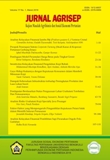Main Article Content
Abstract
Corporate farming is a farmland merger activity that is organized together by
farmers in an integrated single management. This system could be a solution for many problems facedby farmerstoday, such asbusiness efficiency, quality standardization, and effectivenessas well as input use efficiency.Gerbang Emas Agricultural Cooperative is a farmer’s business organization focusing on the production and marketing of horticultural crops. The cooperative has implemented the collective marketing since 2014, but the production is carried out individually by the farmers. Low level of productivity is the problem the cooperative faced. The farming activities that are currently done by the farmers would be more efficient if managed by implementing the corporate farming system. The purpose of this study is to analyze the prospect for the implementation of corporate farming system and also to determine the factors affecting the likelihood of success or failure in the system implementation at Gerbang Emas Agricultural Cooperative. The research method used is the descriptive method, analyzing the prospect
from three perspectives (economic, institutional, and social). The result shows that the corporate farming system has a good prospect to be implemented on the cooperative, viewed from all perspectives. In addition, this study also obtained several factors that affect the likelihood of success or failure in the implementation of the system on the cooperative namely: 1)Integration of corporate farming development with local economic development,2)Availability of capable institutions (government / non-government) of functioning as a facilitator, 3)Emotional and cultural ties between the farmer and his land, 4)Differenceperceptions among farmers, 5)Deferentin the development of agribusiness system.
Article Details
Authors who publish with this journal agree with the following terms:
- Authors retain copyright and grant the journal right of first publication with the work simultaneously licensed under a Creative Commons Attribution-ShareAlike 4.0 International License that allows others to share the work with an acknowledgment of the work's authorship and initial publication in this journal.
- Authors are able to enter into separate, additional contractual arrangements for the non-exclusive distribution of the journal's published version of the work (e.g., post it to an institutional repository or publish it in a book), with an acknowledgment of its initial publication in this journal.
- Authors are permitted and encouraged to post their work online (e.g., in institutional repositories or on their website) prior to and during the submission process, as it can lead to productive exchanges, as well as earlier and greater citation of published work (See The Effect of Open Access).
- This work is licensed under a Creative Commons Attribution-ShareAlike 4.0 International License.
References
- Dinas Pertanian 2000. Panduan Rice Estate and Corporate Farming. Bandung.
- Kurnia, Ganjar. 2004. Petani: Pejuang yang Terpinggirkan. Bandung: Unpad.
- Kurniati, E. dan Hawa. L. C. 2003. Studi Kesiapan Petani Untuk Melaksanakan Pengelolaan Usaha Tani Melalui Pendekatan Ekonomi Sebagai Perusahaan Pertanian. Jurnal Ilmu-Ilmu Sosial. 15(1):1-12.
- Setiawan, Iwan. 2008. Collective Farming sebagai Alternatif Strategi Pemberdayaan
- Petani. Bandung: Unpad.
References
Dinas Pertanian 2000. Panduan Rice Estate and Corporate Farming. Bandung.
Kurnia, Ganjar. 2004. Petani: Pejuang yang Terpinggirkan. Bandung: Unpad.
Kurniati, E. dan Hawa. L. C. 2003. Studi Kesiapan Petani Untuk Melaksanakan Pengelolaan Usaha Tani Melalui Pendekatan Ekonomi Sebagai Perusahaan Pertanian. Jurnal Ilmu-Ilmu Sosial. 15(1):1-12.
Setiawan, Iwan. 2008. Collective Farming sebagai Alternatif Strategi Pemberdayaan
Petani. Bandung: Unpad.
